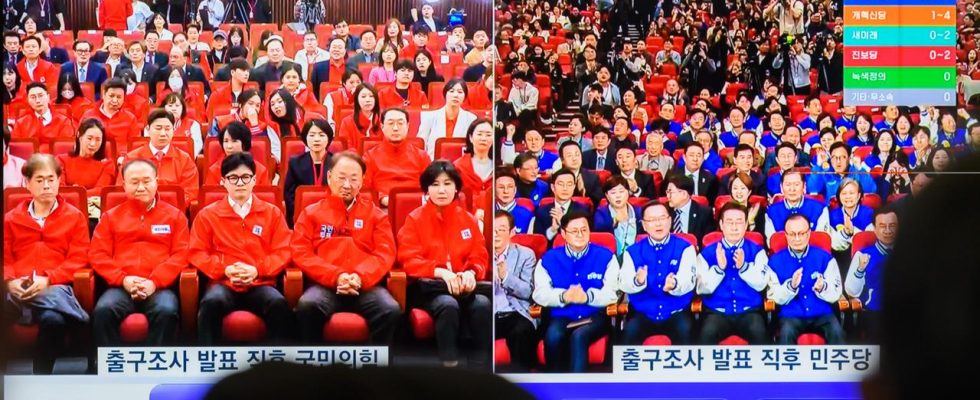The opposition won a comfortable majority in South Korea’s parliamentary election. It is a serious setback for President Yoon – it threatens to render him largely unable to act domestically for years.
In South Korea, the social-liberal opposition achieved a clear victory in the parliamentary elections. Opposition leader Lee Jae Myung’s Democratic Party (DP) maintained its position as the largest single party in the National Assembly, South Korean broadcasters reported.
The voters also dealt a serious blow to President Yoon Suk Yeol. As a result of the opposition’s success, the conservative head of state is now in danger of becoming largely incapable of acting domestically during his remaining three years in office.
DP can count on 160 out of 300 seats
According to reports, after almost all votes were counted, the DP could expect more than 170 out of 300 seats in the National Assembly. The opposition also includes the new party “Rebuilding Korea” led by former Justice Minister Cho Kuk. It was expected to win between twelve and 14 seats. Yoon’s People Power Party (PPP) would therefore be represented by a maximum of 100 MPs in the future. In addition to the direct mandates, 46 seats are awarded to list candidates based on the proportional share of votes in the election, which takes place every four years.
This heralded a continuation of the difficult political balance of power in Asia’s fourth largest economy. Yoon’s party had hoped for a shift in power in her favor so that she could more easily push through legislation.
PPP leader Han Dong Hoon had already expressed disappointment over the results of post-election polls by various broadcasters, which had predicted an overwhelming victory for the opposition. Experts spoke on television of an impending disaster for the government camp.
Next Presidential election Planned for 2027
The election was seen as an important interim test for the government. The next presidential election is scheduled for 2027. Yoon, who won the election two years ago narrowly ahead of DP leader Lee, will no longer be allowed to run as re-election is not permitted under the constitution.
Yoon has been suffering from low poll numbers for months. He has so far been unable to implement key promises of his presidential campaign, such as tax cuts or the regulation of companies. However, the opposition is unlikely to achieve a two-thirds majority in parliament with which it could override the president’s right of veto and pass constitutional amendments.
During the election campaign, the DP and other parties accused the government of economic incompetence, among other things in view of rising prices for food and other goods. The PPP, on the other hand, asked voters to support the government’s reform policies and keep the opposition in check.
According to preliminary information from the State Election Commission, turnout was 67 percent. This was the highest number in a parliamentary election in 32 years.

